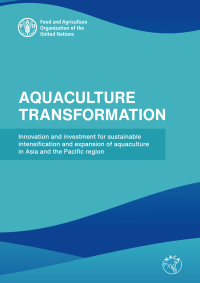High-level meeting on aquaculture transformation in Asia and the Pacific region
28 November 2022 | 3509 views | Better management practices, Education and Training, Emerging Global Issues, Environment and Sustainability, Food Security, Safety and Certification, Governance and Policy, Health and Biosecurity, Livelihoods, gender and social issues, Markets and trade
As a follow on from the September FAO/NACA workshop on aquaculture transformation, FAO and NACA convened a high-level meeting to discuss the issue and the outcome of the previous consultation with policy makers. The meeting was held virtually from 22-23 November and was attended by 79 senior officials from 25 countries and international organisations, with observers from industry and international NGOs.
Specific objectives of the high-level meeting were to:
- Engage senior policy makers and business leaders in the process of defining regional targets, action areas and initiatives for aquaculture transformation in the region by 2030.
- Identify strategies and mechanisms to stimulate innovation and investment.
- Enhance collaboration in the defined action areas.
- Recommend follow up actions and commitments on aquaculture transformation as a regional contribution to the global targets.
The high-level meeting provided a forum for government, private sector and development partners to identify policy, innovation and investment priorities for aquaculture transformation in the region by 2030.
As a background to the meeting FAO and NACA developed a white paper entitled Aquaculture transformation: innovations and investment for sustainable intensification and expansion of aquaculture in Asia and the Pacific region, drawing on contributions from stakeholders across the region through the September consultation. The draft was informed by a series of country analyses, a regional synthesis, and an aquaculture investment paper.
The white paper provides guidance on the translation of the global vision and targets for ‘blue transformation’ into clear and workable strategies for transforming the aquaculture sector of the region. It has considered the FAO Committee on Fisheries Declaration for Sustainable Fisheries and Aquaculture and the Shanghai Declaration, which outline ways to maximise the contribution of aquaculture to the 2030 Agenda and the Sustainable Development Goals.
Blue transformation will not be achieved without innovation in systems, investments and partnerships. It requires commitment from national and local governments, private business and investors, civil society organisations and other stakeholders to work together towards sustainable aquatic food systems. The white paper provides guidance to put these global aspirations into practical action.
An important focus of the discussions at the high-level meeting was on follow up actions for implementing aquaculture transformation, with special emphasis on strengthening regional collaboration to progress aquaculture transformation at the scale needed.
Aquaculture transformation through sustainable intensification and expansion of aquaculture is widely recognised as a priority for the future of sustainable agrifood systems in Asia and the Pacific region. The region is the world’s aquaculture leader and its progress in aquaculture transformation has global implications for the blue transformation agenda.
Creative Commons Attribution.
